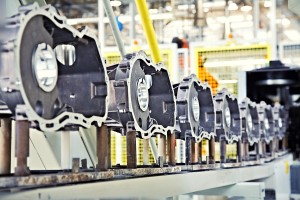Over the past couple of years, a number of public officials and economists have presented the case that manufacturing jobs are returning to the United States from emerging markets as part of a trend called by some as “onshoring.” Unfortunately for the U.S. labor market, it’s simply just a myth and a misunderstanding.
Writing a column published in the Project Syndicate entitled “The Onshoring Myth?” Federico Diez, an economist at the Federal Reserve Bank of Boston, and Gita Gopinath, a visiting scholar at the central bank, argued the jobs aren’t necessarily making a homecoming, and the data doesn’t support it.
The two economists admitted that corporations are establishing new plants in the U.S. – Apple recently created a plan in Arizona and Texas, for example, while General Electric is planning to situate their washing machine and refrigerator manufacturing locations in Kentucky – and it does suggest that labor costs are slowly rising in overseas markets.
 However, Diez and Gopinath posit that there is no definitive evidence to say U.S. jobs sent across the pond are making a comeback in the Land of the Free.
However, Diez and Gopinath posit that there is no definitive evidence to say U.S. jobs sent across the pond are making a comeback in the Land of the Free.
“Upon closer inspection, however, the data for 1999-2012 present little evidence of significant onshoring of U.S. manufacturing,” stated Diez and Gopinath. “For starters, the share of U.S. domestic demand for manufactures that is met by imports has shown no sign of reversal. In fact, the offshoring of manufacturing increased by nine percent.”
Despite the negative conclusions put forward by the financial minds, there are some bright spots in the data. For instance, there are diminishing factors in emerging markets’ low-cost advantages, such as when exchanged rates are taken into account then U.S. manufacturing unit labor costs fell by nearly one-third since 2001. Also, the nation’s percentage of international manufacturing exports has stabilized since dropping 4.5 percent between the years 2000 and 2008.
Furthermore, there are other positives when it comes to U.S. production of shale gas.
“Industries with large energy requirements, like chemical manufacturing, have experienced a much smaller increase in import share than less energy-intensive industries like computers and electronic products. This suggests that energy-intensive sectors are more likely to experience onshoring,” they added.
In the end, though, there isn’t enough substantiation to suggest amplified onshoring.
“Of course, given that the increase in emerging economies’ labor costs and the decline in American energy prices are recent developments, import shares could begin to decline in a few years. But, with that outcome far from certain, the U.S. cannot rely on a rapid increase in manufacturing competitiveness to underpin its economic recovery.”
The Fed economists did not cite high corporate taxes as being a reason for the lack of onshoring – the U.S. maintains a corporate tax base of 35 percent, one of the highest percentages in the world today. This has caused many companies to leave the U.S. and set up shop in nations with low labor costs, like India and China.
Last week, corporate inversions were the primary topic to discuss as President Obama lambasted companies for merging with smaller overseas corporations to avoid paying taxes in the U.S.
Billionaire investor Mark Cuban eventually thinks inversions will prompt Washington to impose higher taxes to make up for the lost revenue.



